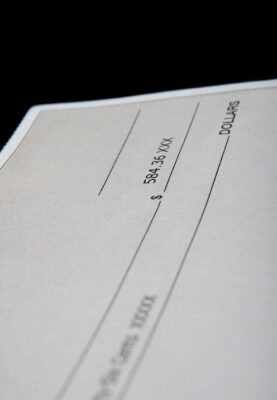
Third-party checks offer convenience in some scenarios, but they can also present unique challenges and risks. Whether you are receiving or trying to cash one, understanding these potential pitfalls can help you avoid unnecessary frustrations.
What Is a Third-Party Check?
Before diving into the issues, it’s essential to clarify what a third-party check is. A third-party check involves three people or entities:
- The payer (who writes the check).
- The payee (to whom the check is initially written).
- The third-party (a new recipient who cashes or deposits the check after it is signed over).
For example, John receives a check from Mary. Instead of cashing it himself, John endorses it over to Lisa, allowing her to collect the funds. While this may seem straightforward, cashing such checks often raises red flags with banks or financial institutions.
Banks May Refuse to Cash Third-Party Checks
One of the most common pitfalls is finding a place that will cash a third-party check. Many banks hesitate to process these checks due to the increased risk of fraud or forgery.
- Why do banks reject them? Third-party checks can be hard to verify. If the check is forged or fraudulent, the bank could suffer losses.
- Alternative solutions: Some credit unions, smaller banks, or check-cashing services may accept them, but each has its own policies and verification processes.
Endorsement Errors Can Cause Delays
To successfully cash or deposit a third-party check, proper endorsement is crucial. Even minor errors in this process can lead to the check being rejected.
- Common mistakes:
- Forgetting to sign the back of the check.
- Not writing “Pay to the order of [Third Party’s Name]” above the signature.
- Providing unclear or incomplete information.
- Solution: Follow the endorsement process carefully, and ensure you have identification to confirm the transfer of ownership.
Fraud Risks for the Recipient and Payee
Fraud is a significant concern with third-party checks. If the check bounces, the financial responsibility often falls on the person attempting to cash it.
- For the third party (new recipient): If the check is invalid, you may not receive the funds. Banks may also charge fees for returned checks.
- For the original payee: A third party attempting to forge your signature could put you at risk of financial fraud.
To reduce these risks, only accept checks from trusted sources and verify their authenticity before endorsing them.
Limited Cashing Locations
Unlike regular checks, third-party checks are not widely accepted at major banks, ATMs, or mobile deposit systems. Many financial institutions outright refuse to process them to avoid potential liability and verification hassles. Knowing where to cash a third-party check can save you time and frustration.
Some options include:
- Banks where you or the original payee has an account.
- Check-cashing services (though they often charge significant fees).
- Retail stores with specific check-cashing policies.
Always call ahead to confirm that a location accepts third-party checks and what documentation is required.
Fees for Cashing Third-Party Checks
If you do manage to find a check-cashing service or retail outlet willing to process the check, be prepared for the associated fees.
- Common costs: Some services charge a percentage of the check amount or a flat fee.
- Why the fees exist: Fees compensate for the higher risk and inconvenience of processing third-party checks.
To minimize fees, consider opening a bank account or working with a credit union, as they may offer more favorable options.
Potential Legal Complications
Third-party checks can occasionally lead to misunderstandings or legal disputes, especially if the check is endorsed without the payee’s explicit permission.
- Fraud accusations: Unauthorized endorsement may be considered fraud.
- Ownership disputes: Banks may freeze funds if ownership of the check comes into question.
To avoid these issues, ensure all endorsements are legitimate and documented. Communicate clearly with all parties involved before transferring the check.
Delays in Funds Availability
Even when successfully cashed, third-party checks may take longer to clear due to additional verification steps.
- Why delays occur: Banks may place holds on third-party checks to confirm their validity.
- How to avoid delays: Ensure proper endorsement and deposit the check at a bank where you or the original payee already has an account.
Identity Verification Requirements
Cashing a third-party check often involves stricter identity verification processes to prevent fraud. Banks and check-cashing services may require multiple forms of identification, including a government-issued ID, proof of address, or even the original payee’s presence.
Failure to meet these requirements can result in delays or rejection. To streamline the process, ensure all parties have valid identification and confirm any documentation needed in advance with the institution.
Navigating Third-Party Check Transactions
While cashing a third-party check may seem like a simple solution, it often comes with complications, including rejections, fees, and delays. Understanding these pitfalls can help you navigate the process more effectively and avoid unnecessary headaches. Always double-check the rules of the bank or service you plan to use and proceed with caution to ensure a smooth transaction.









